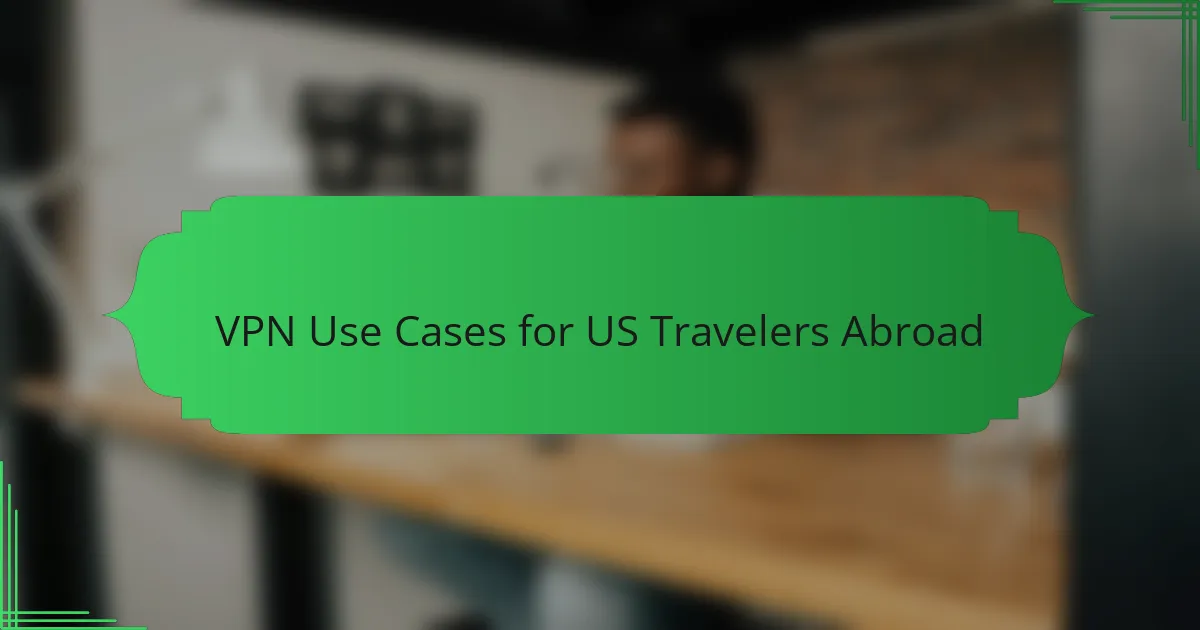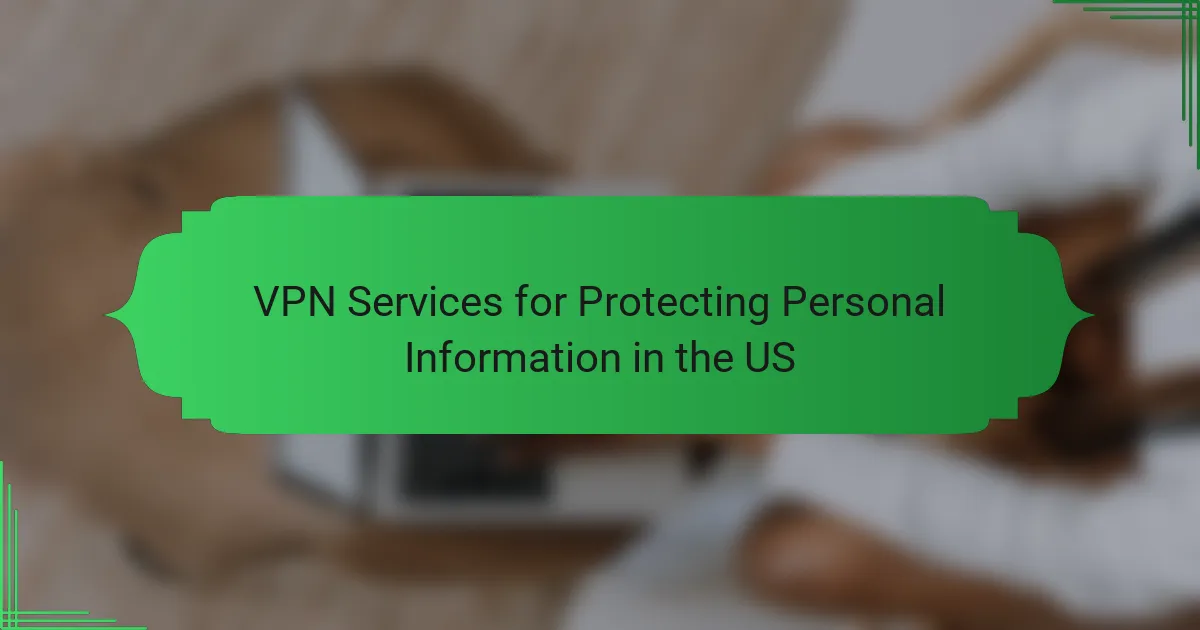For US travelers venturing abroad, using a VPN can greatly enhance online security and privacy. By encrypting internet traffic and masking IP addresses, VPNs protect personal information from potential threats in unfamiliar environments. Additionally, the best VPNs offer strong security, high-speed connections, and reliable access to content, making them essential tools for safe and seamless internet use while traveling.
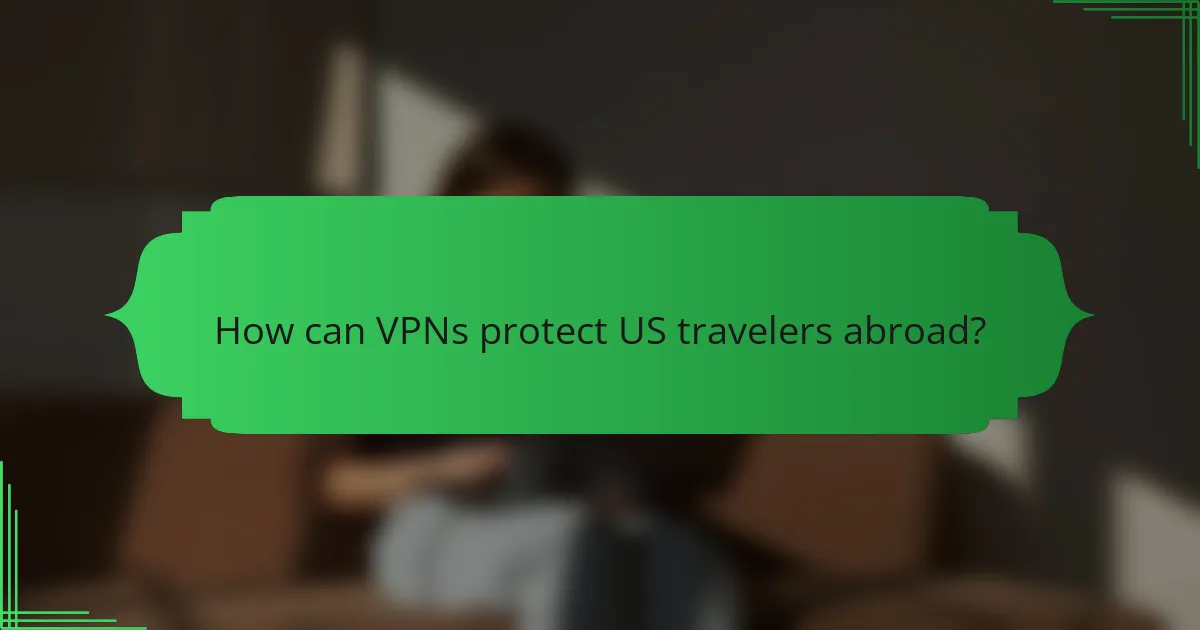
How can VPNs protect US travelers abroad?
VPNs can significantly enhance the online security and privacy of US travelers while they are abroad. By encrypting internet traffic and masking the user’s IP address, VPNs help safeguard personal information from potential threats in unfamiliar environments.
Encryption of internet traffic
VPNs encrypt internet traffic, making it difficult for hackers and third parties to intercept data. This encryption ensures that sensitive information, such as passwords and financial details, remains secure while traveling.
Travelers should look for VPNs that use strong encryption protocols, such as OpenVPN or IKEv2, which provide robust protection against eavesdropping. Always check the VPN provider’s specifications to ensure they meet security standards.
Protection against local surveillance
Using a VPN helps protect against local surveillance by masking your online activities. In some countries, internet usage is closely monitored, and a VPN can prevent authorities from tracking your browsing history.
Travelers should be aware that some regions have strict regulations regarding VPN usage. It’s advisable to research local laws before using a VPN to avoid potential legal issues.
Secure access to public Wi-Fi
Public Wi-Fi networks can be hotspots for cybercriminals looking to steal personal data. A VPN provides a secure tunnel for your internet connection, making it safer to use public Wi-Fi in cafes, airports, and hotels.
When connecting to public networks, always activate your VPN to ensure your data remains encrypted. Avoid accessing sensitive accounts or making transactions without the protection of a VPN.
Bypassing geo-restrictions
VPNs allow travelers to bypass geo-restrictions on content, enabling access to streaming services and websites that may be blocked in certain countries. By connecting to a server in the US, users can enjoy their favorite shows and services as if they were at home.
However, not all VPNs can reliably bypass geo-blocks. Look for providers that specifically advertise this capability and check for user reviews regarding their effectiveness in different regions.
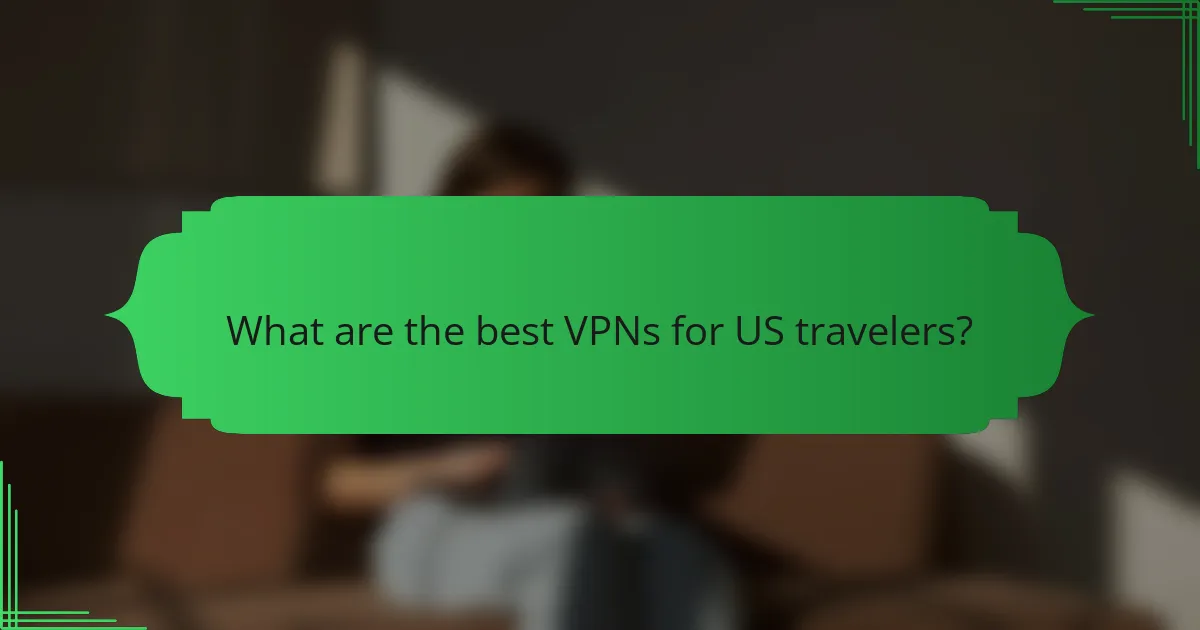
What are the best VPNs for US travelers?
The best VPNs for US travelers typically offer strong security, high-speed connections, and reliable access to content. Popular choices include ExpressVPN, NordVPN, and Surfshark, each catering to different needs and budgets.
ExpressVPN features
ExpressVPN is known for its robust security features, including AES-256 encryption and a strict no-logs policy. It operates over 3,000 servers in 94 countries, ensuring fast and reliable connections for streaming or browsing while abroad.
Additionally, ExpressVPN supports a variety of devices, from smartphones to routers, making it versatile for travelers. Its user-friendly interface allows easy setup, which is ideal for those who may not be tech-savvy.
NordVPN benefits
NordVPN offers a range of benefits, including double VPN encryption for enhanced security and access to over 5,400 servers worldwide. This extensive network helps maintain fast speeds and reliable connections, even in regions with heavy internet restrictions.
The service also includes features like CyberSec, which blocks ads and malware, adding an extra layer of protection for users. NordVPN’s competitive pricing makes it an attractive option for budget-conscious travelers.
Surfshark pricing
Surfshark is one of the most affordable VPN options available, with plans starting at just a few dollars per month when billed annually. It offers unlimited device connections, allowing travelers to secure all their gadgets without additional costs.
Despite its lower price point, Surfshark provides strong security features, including a no-logs policy and CleanWeb technology to block ads and trackers. This combination of affordability and functionality makes it a popular choice for US travelers looking to stay secure abroad.
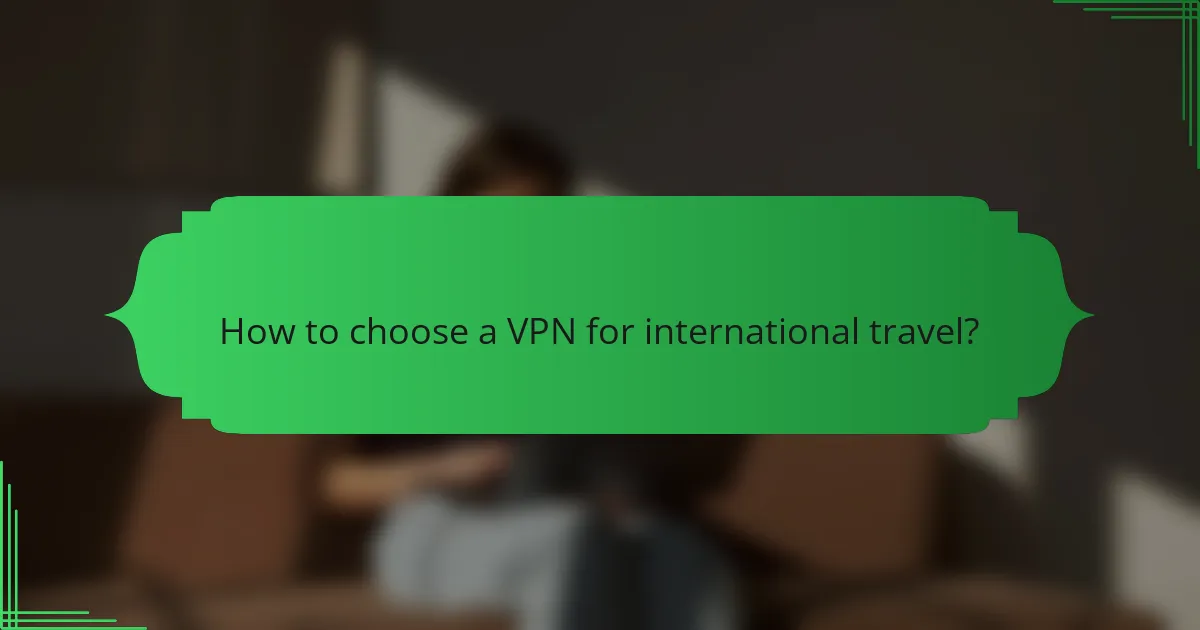
How to choose a VPN for international travel?
Choosing a VPN for international travel involves considering factors like security, speed, and server locations. A good VPN will help you access content and protect your data while abroad.
Criteria for selection
When selecting a VPN for travel, prioritize security features such as strong encryption, a no-logs policy, and reliable customer support. Look for user-friendly interfaces and compatibility with various devices, including smartphones and laptops.
Additionally, consider the pricing structure. Some VPNs offer monthly subscriptions, while others provide discounts for longer commitments. Evaluate the trial periods or money-back guarantees to test the service before fully committing.
Importance of server locations
Server locations are crucial for accessing region-specific content. A VPN with a wide range of servers allows you to connect to your home country’s network, enabling access to streaming services and websites that may be restricted abroad.
Choose a VPN that has servers in multiple countries, especially those you frequently visit. This flexibility can help you bypass geo-restrictions and maintain a stable connection.
Evaluating speed and performance
Speed and performance are essential for a seamless online experience. Look for VPNs that offer high-speed connections and low latency, particularly if you plan to stream videos or engage in video calls while traveling.
Many VPN providers offer speed tests or performance metrics on their websites. Aim for a VPN that maintains speeds close to your regular internet connection, ideally with minimal drops in performance.
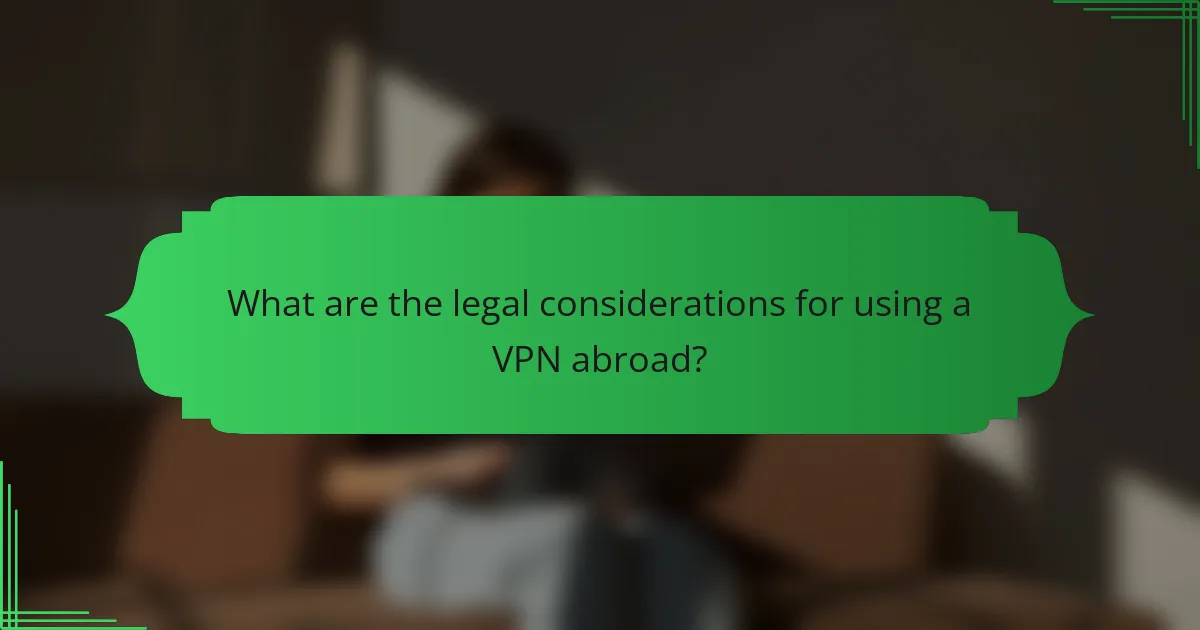
What are the legal considerations for using a VPN abroad?
Using a VPN abroad can have legal implications that vary by country. Travelers should be aware of local laws regarding VPN usage, as some nations impose restrictions or outright bans on VPN services.
VPN legality in popular destinations
In many countries, such as Canada and the UK, using a VPN is legal and widely accepted. However, in places like China and Russia, VPNs are heavily regulated, and unauthorized services may be blocked or penalized. Always check the specific regulations of your destination before using a VPN.
For example, in the UAE, while VPNs are legal, using them to access banned content can lead to significant fines. It’s crucial to understand the local context to avoid legal trouble.
Potential risks of VPN use
While VPNs can enhance privacy, they also come with risks. Using a VPN may expose you to data logging by the service provider, especially if the provider is based in a country with weak privacy laws. Choose a reputable VPN that has a clear no-logs policy.
Additionally, some websites and services may block VPN traffic, limiting access to content. This can be frustrating, particularly if you rely on specific services for work or communication while traveling.
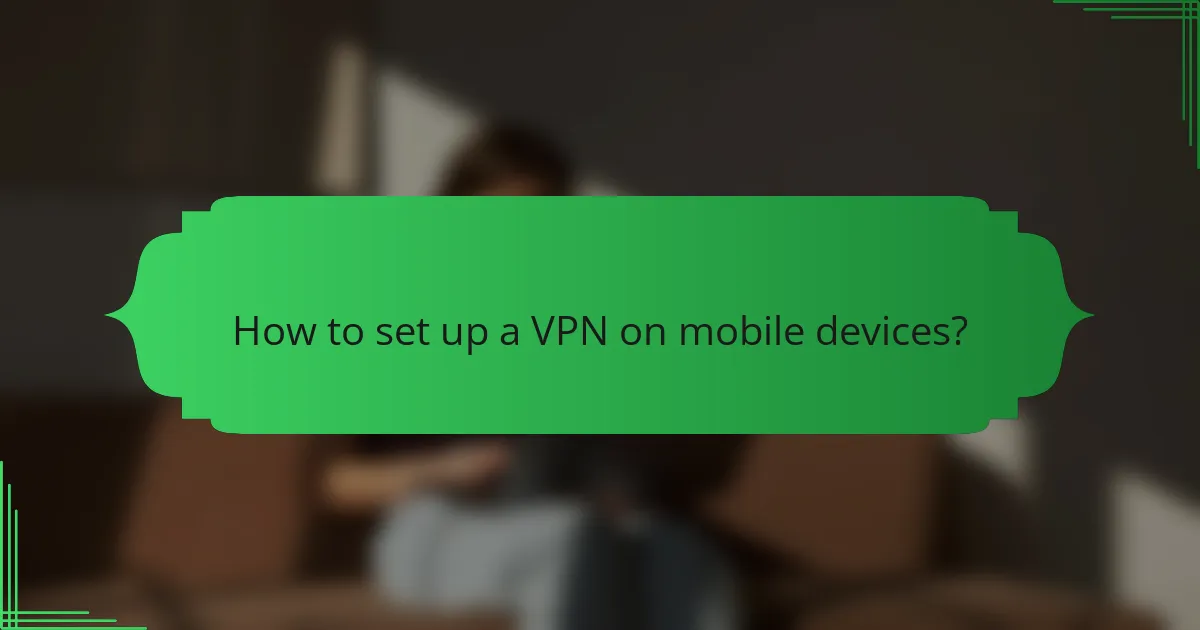
How to set up a VPN on mobile devices?
Setting up a VPN on mobile devices is a straightforward process that enhances your online security and privacy while traveling. By following a few simple steps, you can connect to a secure server and protect your data from potential threats.
Step 1: Downloading the app
Begin by selecting a reputable VPN service that suits your needs. Popular options include ExpressVPN, NordVPN, and CyberGhost, which are available on both iOS and Android platforms. Visit the App Store or Google Play Store, search for your chosen VPN, and download the app.
Ensure you have a stable internet connection during the download to avoid interruptions. Most VPN apps are free to download, but they may require a subscription for full access to their features.
Step 2: Configuring settings
After downloading the app, open it and log in with your account credentials. Most VPNs will guide you through the initial setup process, allowing you to customize your preferences. Look for options such as auto-connect, kill switch, and protocol selection to enhance your security.
It’s advisable to enable the kill switch feature, which disconnects your internet if the VPN connection drops, preventing data leaks. Review the privacy policy to understand how your data will be handled.
Step 3: Connecting to a server
Once your settings are configured, select a server location from the app’s list. Choose a server in the country you wish to appear to be browsing from, which can help you access region-specific content. For instance, if you’re in Europe and want to access US-based services, connect to a server in the United States.
After selecting the server, tap the connect button. The app will establish a secure connection, and you should see a notification indicating that you are connected. Always verify your connection status before browsing to ensure your data is protected.
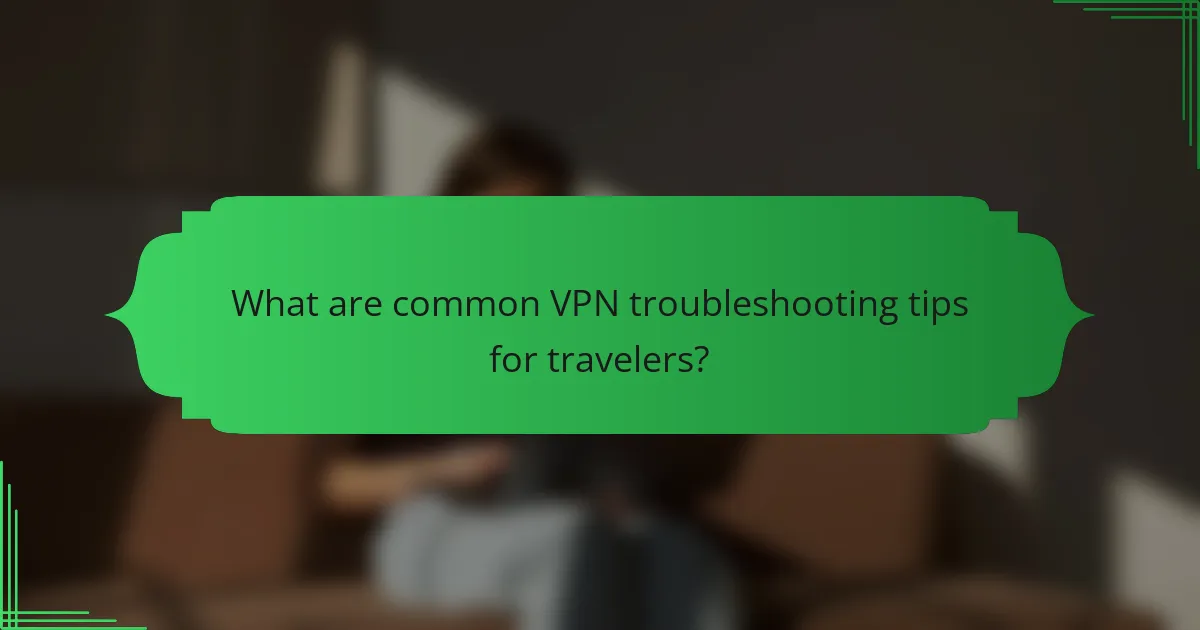
What are common VPN troubleshooting tips for travelers?
Common VPN troubleshooting tips for travelers include checking your internet connection, ensuring the VPN app is updated, and selecting a different server location if issues arise. These steps can help resolve many connectivity problems quickly and efficiently.
Resolving connection issues
To resolve connection issues with your VPN while traveling, first verify that your internet connection is stable. If you’re on public Wi-Fi, consider switching to a mobile data connection for a more reliable experience.
If the VPN app fails to connect, try restarting the app or your device. Additionally, switching to a different server location can often bypass network restrictions or congestion that might be causing the problem.
Fixing slow speeds
Slow VPN speeds can be frustrating, especially when streaming or browsing. To improve speed, connect to a server that is geographically closer to your location, as this can reduce latency and enhance performance.
Another effective method is to switch between different VPN protocols in your app settings. Some protocols, like OpenVPN, offer better speeds than others, depending on your network conditions. Avoid peak usage times when many users are online, as this can also affect your connection speed.
